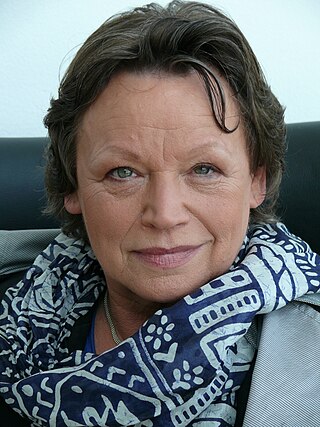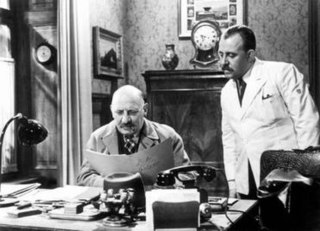Related Research Articles

The film industry in Germany can be traced back to the late 19th century. German cinema made major technical and artistic contributions to early film, broadcasting and television technology. Babelsberg became a household synonym for the early 20th century film industry in Europe, similar to Hollywood later. Early German and German-speaking filmmakers and actors heavily contributed to early Hollywood.

Three Wishes for Cinderella is a 1973 Czechoslovak-East German film based on the fairy-tale Cinderella.

Liselotte Pulver, sometimes credited as Lilo Pulver, is a Swiss actress. Pulver was one of the biggest stars of German cinema in the 1950s and 1960s, where she often was cast as a tomboy. She is well known for her hearty and joyful laughter. Her films outside of German cinema include A Time to Love and a Time to Die (1958), One, Two, Three (1961) and The Nun (1966).
Diana Amft is a German film and television actress and children's writer. She is best known for playing Gretchen Haase in the RTL sitcom Doctor's Diary.

Renate Krößner, also known as Renate Krössner, was a German actress who was internationally recognized for roles in films and television. She was awarded the Silver Bear for Best Actress of the Berlinale for the title role in the 1980 film Solo Sunny. From 1985, she worked in West Berlin and was known for roles in TV series such as Tatort and Einmal Bulle, immer Bulle.

Ursula Werner is a German actress.

Fritz Diez was a German actor, producer, director and theater manager.
A Lively Christmas Eve is an East German comedy Christmas film, directed by Günter Reisch. It was released in 1962.

Sonja Sutter was a German film actress. She was one of the few actors that was allowed to appear in productions in both East and West Germany. She is remembered for her role as Fraulein Rottenmeier in the German TV series Heidi from 1978. This series aired in many countries in Europe during the 1980s and 1990s, and was dubbed into several languages. She is also remembered for having had several roles in the TV series Derrick from 1983 to 1998.

KLK Calling PTZ – The Red Orchestra is a 1971 East German film about the history of the Red Orchestra espionage ring.

Aylin Tezel is a German actress, writer and director. She was born in Bünde. Her father is a Turkish-born medical doctor practicing in Bielefeld, Germany, and her mother is a nurse. She is a middle child, having an older sister and a younger brother. She had her breakthrough with a main role in the film Almanya - Welcome to Germany which premiered at the Berlin International Film Festival in 2011 and with the main role in the film Am Himmel der Tag, for which she received the Best Actress Award at the Torino Film Festival in 2012. In 2023 she released her directorial debut Falling Into Place which won the award of the International Federation of Film Critics, known as the FIPRESCI Prize, at the 27th Tallinn Black Nights Film Festival.
Karin Boyd is a German actress and Theatre director.
Ursula Schaeppi or Ursula Schäppi is a Swiss comedian, radio personality, and stage, voice and film actress starring usually in Swiss German language stage productions and as voice actress in children's literature.

Margrit Rainer born as Margrit Rosa Sandmeier was a Swiss comedian, radio personality, and stage and film actress starring usually in Swiss German language cinema and television and stage productions.

Mathilde Danegger was an Austrian stage and movie actress. Sources may also identify her by the pseudonym, Mathilde Leusch; Leusch is apparently a variant of her second husband's surname (Lesch).

Madness Rules is a 1947 Swiss crime film directed by Leopold Lindtberg and starring Heinrich Gretler, Heinz Woester and Elisabeth Müller. It is based on the 1936 novel of the same name by Friedrich Glauser. Lead actor Gretler reprised his role of the policeman Jakob Studer from the 1939 film Constable Studer, also adapted from a Glauser novel.

Constable Studer is a 1939 Swiss crime film directed by Leopold Lindtberg and starring Heinrich Gretler, Adolf Manz and Anne-Marie Blanc. The film is based on a novel by Friedrich Glauser. It was followed by a sequel Madness Rules in 1947 with Gretler reprising his role.
Karin Ugowski is a German actress, narrator, film producer and furtherer of art and culture in Germany with various stations of work in UK, France, Italy, Israel, Russia, Hungary, Poland, Spain, US and Germany.
Walter Lesch was a Swiss stage and movie producer-director. He was also a writer and, for nearly twenty years after 1933, artistic director of the anti-Nazi Cabaret Cornichon.
Zoë Pastelle Holthuizen known professionally as Zoë Pastelle is a Swiss actress, model, and social media influencer.
References
- ↑ Renate Seydel; et al. "Mathilde Danegger Biographie". Schauspieler; Das große Lexikon der DDR-Stars. Archived from the original on 4 March 2016. Retrieved 19 July 2016.
- ↑ "Steffi-Line: Mathilde Danegger (Biografie)".
- ↑ Trapp, Frithjof; Schrader, Bärbel; Wenk, Dieter; Maaß, Ingrid (22 May 2013). Biographisches Lexikon der Theaterkünstler – Bertha Denigger, geb. Müller – Schauspielerin. ISBN 9783110959697.
- ↑ «Karin Lesch», Von: Sacha Beuth, 23. Dezember 2013. «In der Erinnerung liegt ein Glücksgefühl» Tagblatt der Stadt Zürich (web.archive.org)
- ↑ "IMDb Mathilde Danegger Biography".
- ↑ "Das Zaubermännchen (1960)".
- ↑ "IMDb Karin Lesch Biography".
- ↑ "Drei Haselnüsse für Aschenbrödel – Mitwirkende – Karin Lesch".
- ↑ «Karin Lesch», Von: Sacha Beuth, 23. Dezember 2013. «In der Erinnerung liegt ein Glücksgefühl» Tagblatt der Stadt Zürich (web.archive.org)